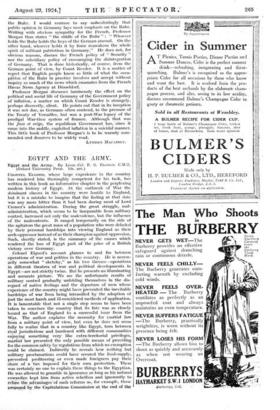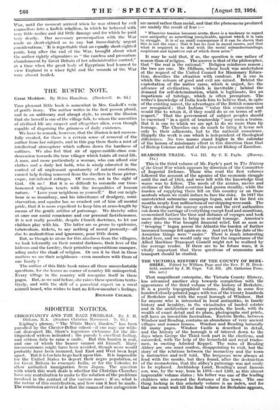EGYPT AND THE ARMY.
Egypt and the Army. By Lieut.-dol. P. 0. ELGOOD: C.M.G. (0iford Uniersity Press. 16s. iiet.) COLONEL ELGOOD, whose large experience in the country has rendered him thoroughly competent: for his task, has written in this book an informative chapter in the perplexing modern history of Egypt. At thc outbreak of War the dominant classes in :the _ country *were hostile to England, birt it. is a mistake to, imagine that the feeling at that date was any more bitter than it had been during most of Lord Cromer's administration.. During the great struggle, mal- administration, which seems to be inseparable from Military control, increased not only the Malevolence, but the influence of the malcontents. It ranged_ temporarily on the side of the agitators the great mass of a population who were deluded by their personal hardships into . viewing England as their arch-oppressor instead of as their champion against oppression. Such, shortly stated, is the summary of the causes which rendered the loss of Egypt part of the price of a British victory . over Germany.
: Colonel Elgood's account glances to and fro between operations of war and politics in the country. He is. necess- arily somewhat " sketchy," as his two themes—operations in different theatres a. war and political developments . in Egypt—are not strictly twins. But he presents an illuminating and accurate picture. We see the unfortunate results of military control gradually, unfolding themselves in the dis- regard regard of native feelings and the departure of men whose experience of the country might have preventedthe inevitable hardshiPs of war from being intensified by the adoption of just the most harsh and ill-considered methods of application. It is lamentable that not a single step seems to have been taken to convince the country that its fate was as closely bound as that of England to a successful, issue from the War. The author explains the necessity for martial law from a military point of view, but even he does not seem fully to realize that in a country like Egypt, torn between rival jurisdictions and burdened with :different communities enjoying something very like extra-territorial privileges, martial law presented the only possible means of providing for the common safetybY regulations from which no exemption could be claimed. Indirectly he. reveals how .nothing but military proclamations could have secured the food-supply, prevented profiteering or even made, foreigners pay their share of a `tax imposed for their- Own: protection. There was certainly no one to explain these things to the Egyptian. He was allowed to grumble inignorance,so long as his natural cowardice kept him from active rebellion and ignorantly. to refuse the advantages: of suclr reforms as, for example, those , proposed by :the-Capitulations- (kmamission' at the end of the AVar, until the moment arrived when he was stirred by evil counsellors into a foolish rebellion, in which he behaved with very little malice and did little . damage and for which he paid very dearly. Our necessary preoccupation with the War made us .shortsighted as to any but immediately urgent considerations:" :"-It is regrettable that an equally short-sightcd panic, long after the end of the War, brought about what the author rightly stigmatizes .as " the careless- and premature abandonment by Great Britain of her administrative control," at a time when the great body of EgyptimiS had learned to view Englund in a wiser light and the wounds of the War were almost healed.



































 Previous page
Previous page